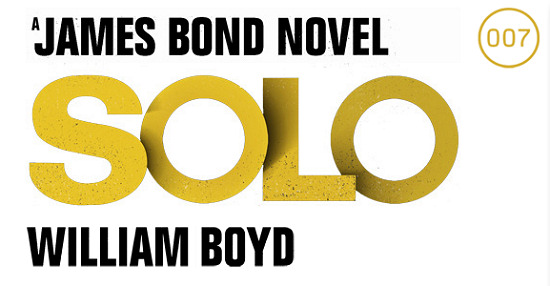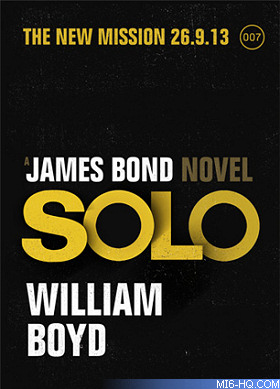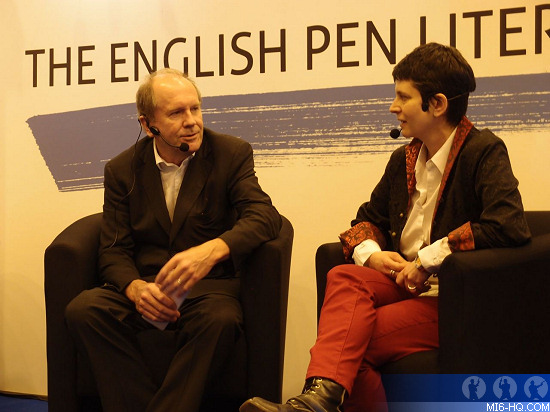William Boyd In Conversation (2)
22nd April 2013
MI6 reports from The London Book Fair where William Boyd unveiled the title of his upcoming James Bond continuation novel
 By MI6 Staff
By MI6 Staff
MI6 reports from The London Book Fair, where William
Boyd, author
of the new Bond continuation novel 'Solo', was 'author of the
day' and was interviewed by Erica
Wagner,
Literary
Editor of The Times. Click
here to read the press release from
Ian Fleming Publications on the announcement of the new title.
![]() William
Boyd In Conversation (1)
William
Boyd In Conversation (1)
|
EW - How was your process of writing different, having to create characters from scratch?
WB - It is slightly different, but that was the advantage of
re-reading the books, because there is a phenomenal amount of
information there, which most people have forgotten about. Fleming
tells you a huge amount about Bond: From his inner thoughts;
his softest emotions to his most savage; his background, where
he lives. Bond's flat is in Chelsea, in Wellington Square, which
is about two hundred yards from where I live, which was another
bonus. Fleming's mother lived in Chelsea. So, getting all that
information allowed me to make Bond seem real in my mind. But
then, of course, I had to invent a villain and various antagonists.
I had to come up with two very interesting women for him to meet
and have a relationship with. So, there was a lot of invention
to be done, not just plotting - my plots are always very elaborate
and complicated, so I had to construct a very elaborate and complicated
plot - but I had to populate that world with creatures of my
imagination, not just the ones that Fleming had.
There is "M" and there is a brief Moneypenny moment,
but otherwise, they're all mine. So, it is ninety-five percent
imagination, I would say, and then all this information that
Fleming provides for you.
EW - I saw the story in the Sunday Times that Bond nearly escaped being called James Secretan.
WB - I didn't read it.
EW - There is a draft (of “Casino Royale”) that has come to light. I wanted to ask you about this because one of the many things that I think you're very good at is naming your characters. I wonder if he had been called James Secretan whether we'd be sitting here now?
WB - It's very much "a rose by any other name would smell as sweet." I mean, you don't know. I was just thinking the other day that Scott Fitzgerald was playing around with titles for "The Great Gatsby" and was going to call "The Great Gatsby" - one of the great titles ever - "Trimalchio on Long Island". Would we be reading it today if it were called "Trimalchio on Long Island"? So, you never can tell.
EW - Or would we be having a conversation about what a ridiculous title "The Great Gatsby" is?
|
|
WB - Maybe. Thank God he didn't choose that! But I think there is something about the name James Bond. Of course, it's like anything you repeat often enough then it seems normal and inevitable. But it's a very simple name and it's unassuming, but it's acquired this incredible glamour and ring to it. I don't know, maybe James Secretan might have been a great name, but somehow, with hindsight (Bond) seems absolutely bang on and very English. Although, interestingly enough, Bond is not English: He's half Scottish, half Swiss. In Casino Royale he says at one stage that: "he knew there was something alien and un-English about him", which I thought was intriguing. EW - Yes, he's become this sort of avatar of Englishness. WB - Well, yes. Queen Elizabeth; Princess Diana; James Bond. That's England to the rest of the world. But in fact he's this odd mixture. His father, Andrew Bond, was a Scottish engineer. Bond went to Eton, but only for two terms; He was kicked out. He went on to a Scottish boarding school for the rest of his school days, so he's a Scottish public schoolboy. These are interesting facts about him that Fleming provides, and so there's a sense of which the Englishness of Bond is something of an illusion. In a way, Sean Connery was perfect casting, initially. |
EW - 1969, aside from the fact that Bond is forty-five, which is significant for him, it is also the year of the moon shot. It's a real year of transition.
WB - There is a very precise reason why I chose that year, which I obviously can't reveal. You're right, it is the year of the moon shot, but the thing about 1969 that I remember, and I was seventeen in 1969, was that it was the first time I came to London. I grew up in Africa and '69 was my summer in London. I remember watching the moon shot in a horrible flat in Pimlico, I remember the music, and I remember the fashions. So, it was great for me to go back to my seventeen-year-old self and imagine the world I was going to put Bond in. There was a lot going on in '69. It was a very interesting period, and of course London was also at the height of it's "Swinging London" coolness. We think of the 60s and London, but actually "Swinging London" didn't really begin until '65, '66. So, to think of Bond in London in '69 is very intriguing. I can remember it vividly.
EW - In 1969, as a middle-aged, forty-five year old man, it makes me think of Don Draper in Mad Men in the late Sixties, who's looking at what's going on amongst the younger people with some puzzlement.
WB - It is interesting, because Bond is born in 1924, so he's a young man in WWII. It's easy to forget that in the late Sixties, if you were a veteran of WWII, you were in your forties. It just changes the whole angle on that period. A lot of people were alive who had fought in WWI. It seems like ancient history now, and the Sixties still seem fresh to us now, but actually it as a different world. The wonderful thing is that there were no mobile phones, no internet and no GPS tracking devices, none of the gadgets that feature in spy novels or contemporary Bond films (existed), so it's real old fashioned spying. The Cold War is at its height and in a way the great spy novels are, I think, in a way, ruined by technology, once the Eighties came along and the Berlin Wall came down, that was the end of the classic era of spy of spy fiction, before all this surveillance technology comes in.
|
EW - It makes it harder to tell the story.
WB - Yes, it does. You really have to think (what he'd do without) a mobile phone. I happened to me when I wrote my novel "Ordinary Thunderstorms", which is set today, and about a man who goes underground. How do you disappear in the late twenty-first century? It's incredibly difficult. So, you're wracking your brains as to how you get around all this high-tech CCTV and so on and so forth, so going back to 1969 is blissful. There's not even security checks at the airport. You can smoke everywhere! So, it was fun to time travel.
EW - So, at this point, will you tell us what it's called?
WB - Yes, well I'm highly conscious that there's a slight air
of anti-climax, but a book has to have a title and, for me, titles
are fantastically important and I spend a lot of time thinking
about my titles. Sometimes they come almost before I've started
writing and at other times I'm about to hand in the book to the
publisher and I still haven't thought of the bloody title! So,
they are really important and, for me, they have to have a ring
and they have to be apt. And so, I finally came up with the title
- obviously, it wasn't just me. I had to run it by everybody
else - but the title that I've chosen for my James Bond novel...is "Solo".
I can say that it is called "Solo" for a very good
reason, because James Bond goes solo in my novel and takes off
on his own private mission, hence the aptness of the title. But
it's a great, chunky, one-word hit, I think.
EW - It's got those two "o"s.
WB - Two "o"s that ghost the "oo7", but I shall leave that to the designer of the cover, but yes, exactly. But everybody knows exactly what it means and, with a bit of luck, people will be curious to find out what happens when Bond does go solo.
Many thanks to Ben Williams, Ian Fleming Publications and Colman Getty. Part three will be published later this month.











